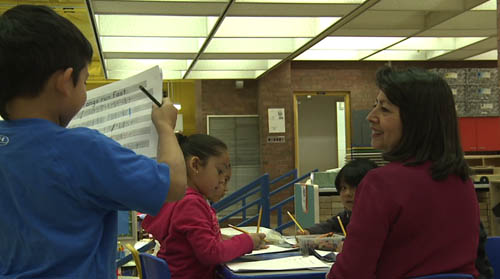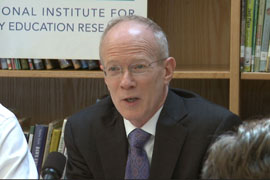Cronkite News has moved to a new home at cronkitenews.azpbs.org. Use this site to search archives from 2011 to May 2015. You can search the new site for current stories.
Report: State failing to adequately support preschool education
WASHINGTON – Arizona has “shut the door” on preschool programs by making funding cuts that leave a bleak educational future for the state’s children, according to a report released Tuesday.
The report by the National Institute for Early Education Research said Arizona in 2010 eliminated the Early Childhood Block Grants that were used to provide accredited preschool education programs for children of low–income families. “The State of Preschool Yearbook 2011″ also said that Arizona no longer has a program specifically funding early childhood education that can be measured in the institute’s survey.
“This is particularly disturbing given that Arizona has a large population of Hispanic children who would benefit a great deal from preschool education,” institute Director Steve Barnett said in a statement.
But an Arizona Department of Education spokesman called it “disingenuous” for the institute to claim that the state does not have a program at all, noting that such programs got more than $6.2 million from the state’s First Things First initiative in 2011. First Things First, approved by voters in 2006, distributes funds from Arizona cigarette taxes to various early childhood education programs.
“Whether or not it meets their criteria of what their report is on, we need to go beyond the scope of their report,” said Ryan Ducharme, the state department spokesman. “And it’s fair to say that Arizona is still providing early childhood programs for children in preschool up through third grade.”
While the report mentions First Things First funding, an institute spokeswoman noted that those funds are not dedicated to early childhood education but can also go toward initiatives like dental and health care as well as home care.
Barnett said state lawmakers cut state funds and left First Things First to pick up the slack.
“What this legislature did, I think, in a very cynical way was simply to eliminate the state’s funding and leave First Things First, this ballot–based initiative, with a Sophie’s choice,” he said. “Do we follow the law and let all of these children go unserved? Or do we step in and use this money for something it was not supposed to do, which is take the place of state funds that have been moved elsewhere?”
But a First Things First spokeswoman agreed with Ducharme that the programs are still being funded, just in another way.
“The intent of the initiative was to build upon what was already existing and to provide the opportunity for more children birth to age 5 to help them arrive at kindergarten well prepared,” said Liz Barker, the spokeswoman.
Ducharme said the state has a very strong relationship with First Things First and ensures Arizona preschoolers are receiving an adequate early childhood education.
“We’re one big education community and we partner up with each other quite a bit to get more bang for our buck,” he said.
In the institute’s previous report, Arizona ranked 40th for state funding out of 40 states measured – 10 states had no programming in 2010 and were not included in the report. Arizona served about 5,000 children in 2010, at $117 per child, and received only three of the 10 suggested benchmarks.
Institute spokeswoman Jen Fitzgerald said the state did much better in prior years: Between 2002 and 2009, Arizona spending per child hovered between $2,000 and $4,000, she said. Still, that spending consistently fell below the national average.
U.S. Education Secretary Arne Duncan said that funding to preschool and pre–kindergarten programs is crucial for the nation’s success.
“I recognize these are tough economic times. But I always say budgets aren’t just numbers. Budgets reflect our values,” said Duncan, speaking at the release of the report. “And if we can invest in high–quality early–learning programs, that solves so many of our social ills. And if we don’t do that, it just simply doesn’t make sense to me.”









